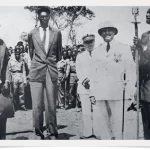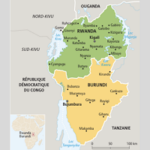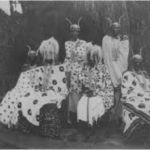Comparative Explorations from West of Lake Kivu
First, the Abozi on Ijwi, who are said to be a part of the Balega clan, take their name from Mwoozi, an ancestor who is said to have helped Ruganzu escape by canoe from some (unspecified) enemies. The Abozi trace their genealogies of about eight names back to Mwoozi. Rwandan commoner genealogies suggest a similar timeframe to Ruganzu. In Rwandan traditions the Abanyabyinshi are said to have descended from a man named Byinshi, a cousin of Ruganzu, accused of having plotted against the Rwandan king. In the pogrom that followed against his family, the Abanyabyinshi were scattered to the west. Drawing onextensive Rwandan sources, Delmas situates the origin of Abanyabyinshi
Aside from the ritual and commoner genealogies from Ijwi, the royal genealogies from Bunyungu (a Hunde state located at the northwest corner of Lake Kivu) and of the Havu parent kingdom on the mainland west of Lake Kivu also contain relevant data. The Hunde list cites a contemporary of Ruganzu and Nsibula; it places him seven generations (from the 1950s), five generations before the Rwandan king Rwabugiri (r. 1865–95), and four generations before a Hunde king killed by Gahindiro (or possibly Rwogera, successor to Gahindiro).Again, this chronological framework points to a time depth to Ruganzu (in Rwanda) and Nsibula (in Buhavu) significantly shallower than we are led to believe from the Rwandan sources cited by Kagame.
The Kalehe list presents a slightly different problem. One version was recorded by a priest of the White Fathers missionary order, a person with access tothe Rwandan king list, because the White Fathers had been intimately involved in the early historical studies in Rwanda, and those in Kivu had frequent contact with the Rwandan Fathers. As it turns out, on this list Nsibula is exactly fifteen names back from 1960; on the Rwandan list, Ruganzu is fifteen names back from 1959. (Nsibula is also given as the contemporary of Ruganzu and of his father Ndahiro II Cyamutaare.) There is a striking concordance of the two king lists, again drawn up by someone with intimate knowledge of the writings on the Rwanda domain but only passing knowledge of Buhavu.
However, there are two small quirks to account for in this Kalehe list. First, it must be noted that the correspondence is not exact in each generation; for example, the Kalehe list has five names since Rwabugiri (late nineteenth century) and nine names encompassing the time of only four Ijwi kings. Granted the Ijwi kings had exceedingly long reigns; that leaves six names before ca. 1820 on the Kalehe list, to cover about three hundred years by Kagame’s chronology.
The other quirk that needs to be explained is that Kabwiika, the father of the first Ijwi king, is said to have been the son of Bamenyirwe I and the brother of Kamerogosa; Kamerogosa had to fight a succession dispute with Kabwiika in order to retain the throne.On this Kalehe genealogy, however, three names appear between Bamenyirwe I and Kamerogosa I (though Kamerogosa’s son is also given as Bamenyirwe). These three names (Nyamushanja, Mpalampala, and Mukulu Orhabona) attract attention, for three reasons. First, they do not correspond to the Ijwi version of Kabwiika’s succession. Second, none of these three names appear in the Kalehe genealogy drawn up by the Belgian administrators of the 1930s; nor does that of Bamenyirwe II, son of Kamerogosa. Third, in the short histories of the kings given in Feys’s list, there are no histories given of these three kings—those between Bamenyirwe I and Kamerogosa I—except the fact that each was enthroned in Kinyaga (a region that now forms the south-western portion of Rwanda). There is no mention of the hill, or the exact location. Both Kamerogosa and Bamenyirwe, however, were cited as having been enthroned at “Luvumu chez Rwabika” on the western shore of the lake.
No explanation is given for this sudden shift to Kinyaga and the sudden return west of the lake to the same hill that had been the site of the capital four generations previously. There is no mention of these Havu kings in the data available from Kinyaga, despite intensive local-level historical study recently carried out in this region. My own work on Ijwi indicates that, although significant elements of the population arrived on Ijwi from Kinyaga, the Havu kingsdid not control Kinyaga at that time. Other variants indicate that Mpalampala was in fact a son of Bamenyirwe and brother of Kamerogosa—but not a king. Mukulu Orhabona is not a dynastic name. Most, probably, this is an apocryphal sobriquet; it means “the elder who does not see.” It is doubtful that any king car-ried this name. It is, however, possible that these names were in fact historical personages, though not kings; a Nyamushanja does appear in the Rwandan documents as having been killed by Ruganzu. It is also possible (if unlikely) that some of them were kings who succeeded rapidly one after another, so as to have left few traces in the historical traditions.46 But even in this case, it is likely the three combined did not rule more than a generation.
On balance, the evidence suggests that it is unlikely that these three were historical Havu sovereigns. No oral data that I am aware of confirm their names; nor is there any commentary on how Père Feys constructed this king list. If the suspicion cast on the validity of these three names as kings proves valid, the effect will be to shorten the Kalehe king list to some twelve names total; but, it is important to note, it would then contain only four names before the first quarter of the nineteenth century
https://uk.amateka.net/comparative-explorations-from-west-of-lake-kivu/https://uk.amateka.net/wp-content/uploads/2020/05/kinyaga_b.jpghttps://uk.amateka.net/wp-content/uploads/2020/05/kinyaga_b-150x150.jpgHistory of kingsSocial & cultureFirst, the Abozi on Ijwi, who are said to be a part of the Balega clan, take their name from Mwoozi, an ancestor who is said to have helped Ruganzu escape by canoe from some (unspecified) enemies. The Abozi trace their genealogies of about eight names back to Mwoozi....BarataBarata rpierre@ikaze.netAdministratorAMATEKA | HISTORY OF RWANDA



